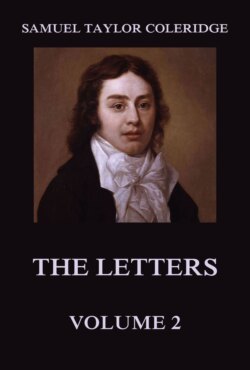Читать книгу The Letters Volume 2 - Samuel Taylor Coleridge - Страница 29
На сайте Литреса книга снята с продажи.
CLXIX. TO THE SAME.
Оглавление[Postmark] Bury St. Edmunds,
July 20, 1808.
Dear Sir,—Not having been gratified by a letter from you, I have feared that the freedom with which I opened out my opinions may have given you offence. Be assured, it was most alien from my intention. The purport of what I wrote was simply this—that severe and long-continued bodily disease exacerbated by disappointment in the great hope of my Life had rendered me insensible to blame and praise, even to a faulty degree, unless they proceeded from the one or two who love me. The entrance-passage to my heart is choked up with heavy lumber, and I am thus barricadoed against attacks, which, doubtless, I should otherwise have felt as keenly as most men. Instead of censuring a certain quantum of irritability respecting the reception of published composition, I rather envy it—it becomes ludicrous then only, when it is disavowed, and the opposite temper pretended to. The ass’s skin is almost scourge-proof—while the elephant thrills under the movements of every fly that runs over it. But though notoriously almost a zealot in behalf of my friend’s poetic reputation, yet I can leave it with cheerful confidence to the fair working of his own powers. I have known many, very many instances of contempt changed into admiration of his genius; but I neither know nor have heard of a single person, who having been or having become his admirer had ceased to be so. For it is honourable to us all that our kind affections, the attractions and elective affinities of our nature, are of more permanent agency than those passions which repel and dissever. From this cause we may explain the final growth of honest fame, and its tenacity of life. Whenever the struggle of controversy ceases, we think no more of works which give us no pleasure and apply our satire and scorn to some new object, and thus the field is left entire to friends and partisans.
But the case of Mr. Clarkson appeared to me altogether different. I do not hold his fame dear because he is my friend; but I sought and cultivated his acquaintance, because a long and sober enquiry had assured me, that he had been, in an aweful sense of the word, a benefactor of mankind: and this from the purest motives unalloyed by the fears and hopes of selfish superstition—and not with that feverish power which fanatics acquire by crowding together, but in the native strength of his own moral impulses. He, if ever human being did it, listened exclusively to his conscience, and obeyed its voice at the price of all his youth and manhood, at the price of his health, his private fortune, and the fairest prospects of honourable ambition. Such a man I cannot regard as a mere author. I cannot read or criticise such a work as a mere literary production. The opinions publicly expressed and circulated concerning it must of necessity in the author’s feelings be entwined with the cause itself, and with his own character as a man, to which that of the historian is only an accidental accession. Were it the pride of authorship alone that was in danger of being fretted, I should have remained as passive in this instance as in that of my most particular friend, to whom I am bound by ties more close and of longer standing than those which connect me personally with Mr. Clarkson. But I know that any sarcasms or ridicule would deeply wound his feelings, as a veteran warrior in a noble contest, feelings that claim the reverence of all good men.
The Review was sent, addressed to you, by the post of yester-evening. There is not a sentence, not a word in it, which I should not have written, had I never seen the author.
I am myself about to bring out two works—one a small pamphlet[46]—the second of considerable size—it is a rifacciamento, a very free translation with large additions, etc., etc., of the masterly work for which poor Palm was murdered.
I hope to be in the North, at Keswick, in the course of a week or eight days. I shall be happy to hear from you on this or any other occasion.
Yours, dear sir, sincerely,
S. T. Coleridge.
